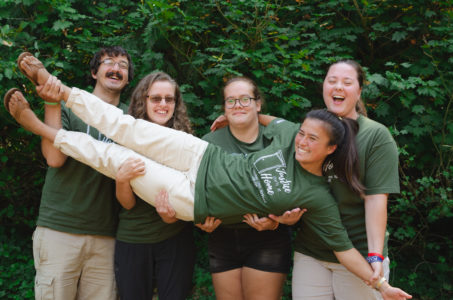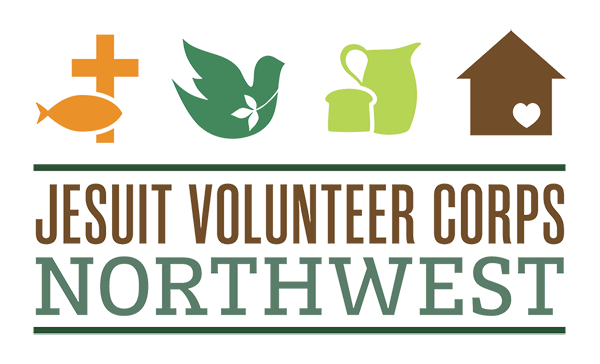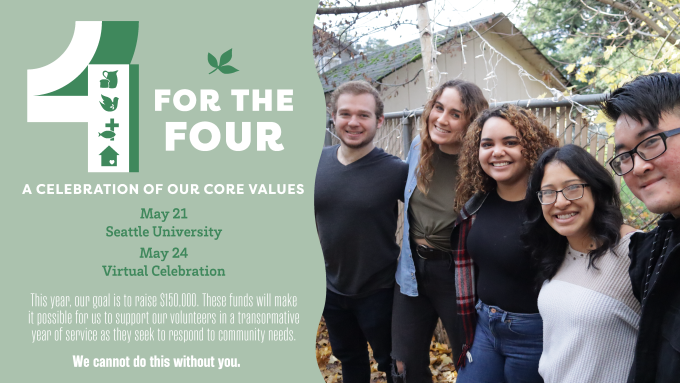#JVReflects by Gabby Hiestand Salgado (Bethel, AK ’18-19) serving at KYUK TV/Radio as Wellness Programming Producer.
Climate change is coming to the Yukon Kuskokwim Delta. In fact, one could easily argue that climate change has already made its way into the very way of life of the people here. The planet is changing. Storms are devastating the southeast United States at rates that are unbelievable. And while Florida and Puerto Rico are covered in water, northern California is experience some of the worst fires they have ever seen. The YK Delta is another region, of many, to be adversely affected, perhaps even disappear completely, because of these changes.
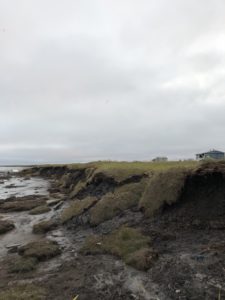
Within the Yukon Kuskokwim Delta, there are around 56 villages that will eventually be gone, having sunk into the ever melting permafrost or eaten away by the harshness that is the ocean and surrounding rivers. Recently I was given the opportunity to travel to one of these villages, Newtok, with a documentary crew from KYUK, my JV AmeriCorps service placement and the public radio/TV station out of Bethel, Alaska, in order to create a documentary about the effects the climate has had on the people of this village.
Before I go on let me explain my JV AmeriCorps service position with KYUK. I am the Wellness Programming Producer so it is my responsibility to help create content that will benefit the lives of the people in the YK Delta. One part of my role is to produce a radio show called “Wellness Wednesday” where we get health professionals or other people who provide services that benefit the community to come on the radio and talk for an hour about health and wellness in the region. Another large part of my job is to help the media department produce documentaries that go on to benefit the Delta as a whole.
So we went to Newtok.
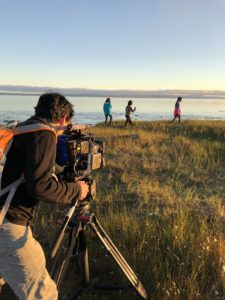
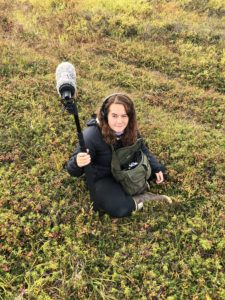
In Newtok, a small village of 450 people, miles of coastline have eroded so much, and so quickly, that elders can recall walking out to the river and looking back to see small houses. Now the closest house is about to fall into the river. People are afraid that the next storm will cause more than a few houses to fall into the river.
We were able to sit down with one woman who really emphasized her greatest fears and the lengths she would go to in order to not be in Newtok for the winter. Last winter this woman was so afraid of the erosion and the storms she moved across the river to Nelson Island, where they are setting up new housing for the people of Newtok. There she lived in a tent before switching to a shipping container in order to protect herself from the cold and the bears. Imagine being so afraid of your home you move into a shipping container where there’s a risk of suffocation and freezing to death. This year she plans to move to Bethel, where her son lives, because she does not want to stay another winter in Newtok.
She is not the only one who’s scared. On the other side of the village, some houses are a mere ten feet from falling into the river. An island that once lay a few miles away is no longer visible because the water has risen so high. The village as a whole is scared, but what can they do? The solution for Newtok is to move the whole village. They are moving nine miles across the river to a new village, Mertarvik. Mertarvik is located on volcanic rock so there’s no fear of erosion again.
However, the village will not be able to move for another few years. The cost of moving an entire village has stalled the work. KYUK was in Newtok to create a piece to show people the devastation. The people outside the village and outside the Delta need to know what’s happening in Newtok because there is still so much work to be done.
It may be hard to believe but Newtok is one of the lucky villages in the region. Yes, they are losing their ancestral land and being forced from their homes out of fear, but at least they have a new home to go to. There are so many villages that are and will be affected by climate change that will have nowhere to go when their houses start to sink due to melting permafrost, or begin to disappear because water levels are rising. The village of Napakiak has already begun preparation for relocation, but is that really an option for every affected village in the YK Delta? Unfortunately, this land is disappearing. Who knows what will be here in the next twenty years, let alone fifty.
The UN has predicted that if humankind does not take significant steps to halt climate change that the planet will be completely devastated by 2040. That’s barely twenty years away, but the permafrost is melting now. Many experts believe that it’s inevitable that the Yukon-Kuskokwim Delta will be gone by 2050. Looking for future solution is long past due. Newtok is acting as fast as they can to protect their way of life, as are many of the other villages in the region, but it’s important to remember that this preparation is no longer something that can be put off or saved for later. The impacts of climate change are happening now all over the world, all over the United States, and right here in Alaska.
The driving factor for how I view this year’s theme for the Jesuit Volunteer Corps Northwest Justice Starts at Home is how do I balance my thoughts and ideas about what justice is and how to do I serve without being part of the problem? I want to help, but who am I to say the people of Bethel and the Yukon-Kuskokwim Delta need help from me? Finding the right balance has been hard.
I want justice for the YK Delta, but I’m still trying to find out what that means and how to make that happen. It’s hard to see living thousands of miles away, but now that I’m here I am ready to find the right path. Not just the path to supporting everyone around me, but also in creating an Alaska that will be around in fifty plus years. I am ready to support people in their pursuit of justice because for me Justice Starts at Home means allowing people to create their own justice without enforcing my own ideals.
Personally these ideas have allowed me to reflect on my own place in the world and the impact my actions have on the people around me. For the last five months I have begun to think about the lives that I’m affecting and the people I’m looking to support as they better their lives. I am starting to see the call to create a just world through actions that create better people.
